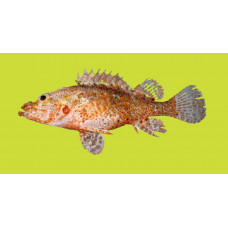Latin name
Scorpaenodes albaiensis
Other name
Scorpaenodes albaiensis
Identification
The longfin scorpionfish has a very bony head protected by numerous spines and lacks an occipital fossa. There is a longitudinal suborbital ridge. There are teeth in the centre of the palate but not on the sides.
Features of fish fins
Dorsal spines (total): 13 - 14; Dorsal soft rays (total): 9 - 10; Anal spines: 3; Anal soft rays: 5.
Fish colouring
The body of these fish is mottled reddish brown.
Distribution
Widespread in the Indo-West Pacific: from East Africa to the Western Pacific. Recently recorded in Tonga.
Habitat
A marine tropical species associated with reefs. Depth range 0 to 20m.
Size
The maximum length of this species is 12 cm.
Behavior
A rare solitary species. Hides in coastal coral reefs and is rarely seen by divers, even at night.
Food and feeding habits
The diet consists mainly of crustaceans, fish (small), invertebrates and zoobenthos.
Reproduction
Female longfin scorpionfish release eggs into the water which are fertilised by the male. The eggs then float to the surface and hatch. The newly hatched fish remain at the surface until they reach maturity.
Fishing
No commercial interest in fishing.
Relationship with a person
Venomous.
| Classification | |
| Phylum | Chordata |
| Class | Actinopterygii |
| Squad | Perciformes |
| Family | Scorpaenidae |
| Genus | Scorpaenodes |
| Species | S. albaiensis |
| Features | |
| Conservation status | Least Concern |
| Habitat | Pelagic |
| Life span, years | No information |
| Maximum body weight, kg | No information |
| Maximum length, cm | 12 |
| Sailing speed, m/s | No information |
| Threat to people | Edible |
| Way of eating | Predator |

